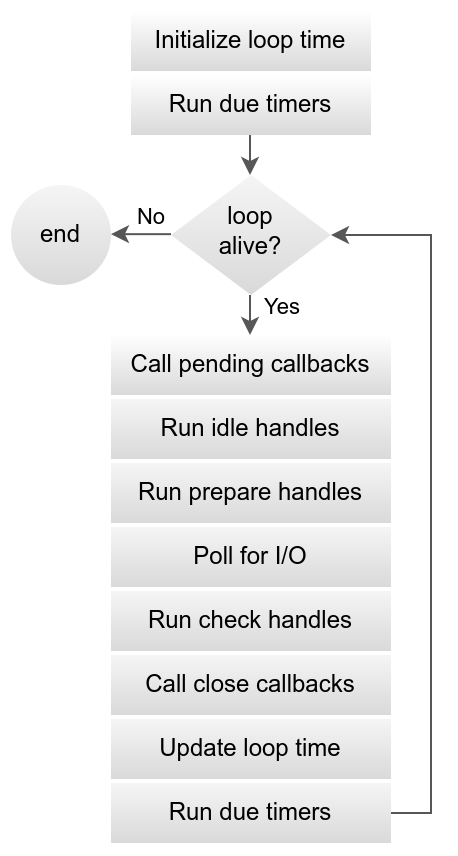Design overview¶
libuv is cross-platform support library which was originally written for NodeJS. It’s designed around the event-driven asynchronous I/O model.
The library provides much more than a simple abstraction over different I/O polling mechanisms: ‘handles’ and ‘streams’ provide a high level abstraction for sockets and other entities; cross-platform file I/O and threading functionality is also provided, amongst other things.
Here is a diagram illustrating the different parts that compose libuv and what subsystem they relate to:
The I/O loop
The I/O (or event) loop is the central part of libuv. It establishes the content for all I/O operations, and it’s meant to be tied to a single thread. One can run multiple event loops as long as each runs in a different thread. The libuv event loop (or any other API involving the loop or handles, for that matter) is not thread-safe except where stated otherwise(除非另有说明,否则libuv事件循环(或涉及循环或句柄的任何其他API)都不是线程安全的).
The event loop follows the rather usual single threaded asynchronous I/O approach: all (network) I/O is performed on non-blocking sockets which are polled using the best mechanism available on the given platform: epoll on Linux, kqueue on OSX and other BSDs, event ports on SunOS and IOCP on Windows. As part of a loop iteration the loop will block waiting for I/O activity on sockets which have been added to the poller and callbacks will be fired indicating socket conditions (readable, writable hangup) so handles can read, write or perform the desired I/O operation.
NOTE:
1、最后一段话说明: callback是在IO loop thread中执行的,对应的是下面的图中的"call pending callback"
In order to better understand how the event loop operates, the following diagram illustrates all stages of a loop iteration:

1、The loop concept of ‘now’ is updated. The event loop caches the current time at the start of the event loop tick in order to reduce the number of time-related system calls.
NOTE:
1、这样做的目的是什么?是为了实现 "High resolution clock"?
2、If the loop is alive an iteration is started, otherwise the loop will exit immediately. So, when is a loop considered to be alive? If a loop has active and ref’d handles, active requests or closing handles it’s considered to be alive.
NOTE: ref’d 参考的(referenced)
3、Due timers are run. All active timers scheduled for a time before the loop’s concept of now get their callbacks called.
NOTE:due timer 可以理解为“到期计数器”;第二句话的主干是:All active timers get their callbacks called.
3、Pending callbacks are called. All I/O callbacks are called right after polling for I/O, for the most part. There are cases, however, in which calling such a callback is deferred for the next loop iteration. If the previous iteration deferred any I/O callback it will be run at this point.
4、Idle handle callbacks are called. Despite the unfortunate name, idle handles are run on every loop iteration, if they are active.
5、Prepare handle callbacks are called. Prepare handles get their callbacks called right before the loop will block for I/O.
6、Poll timeout is calculated. Before blocking for I/O the loop calculates for how long it should block. These are the rules when calculating the timeout:
NOTE:
1、典型的" block with timeout-system call with timeout"
- If the loop was run with the
UV_RUN_NOWAITflag, the timeout is 0. - If the loop is going to be stopped (
uv_stop()was called), the timeout is 0. - If there are no active handles or requests, the timeout is 0.
- If there are any idle handles active, the timeout is 0.
- If there are any handles pending to be closed, the timeout is 0.
- If none of the above cases matches, the timeout of the closest timer is taken, or if there are no active timers, infinity.
Mock asynchronous file I/O
libuv uses a thread pool to make asynchronous file I/O operations possible, but network I/O is always performed in a single thread, each loop’s thread.
NOTE:
1、下面会进行说明
Note
While the polling mechanism is different, libuv makes the execution model consistent across Unix systems and Windows.
File I/O
NOTE:
1、这是典型的asynchronous method invocation(sync to async),它的实现方式是: thread pool + queue
Unlike network I/O, there are no platform-specific file I/O primitives libuv could rely on, so the current approach is to run blocking file I/O operations in a thread pool.
For a thorough explanation of the cross-platform file I/O landscape, checkout this post.
libuv currently uses a global thread pool on which all loops can queue work. 3 types of operations are currently run on this pool:
- File system operations
- DNS functions (getaddrinfo and getnameinfo)
- User specified code via
uv_queue_work()
Warning
See the Thread pool work scheduling section for more details, but keep in mind the thread pool size is quite limited.
